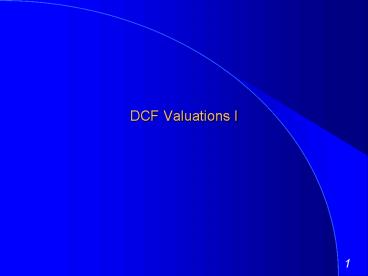DCF Valuations I
Title:
DCF Valuations I
Description:
DCF Valuations I Value and Price When you value a publicly traded company, you will almost always come up with a value that is different from. The most likely ... – PowerPoint PPT presentation
Number of Views:98
Avg rating:3.0/5.0
Title: DCF Valuations I
1
DCF Valuations I
2
Value and Price
- When you value a publicly traded company, you
will almost always come up with a value that is
different from. The most likely explanation for
this is - You are right and the market is wrong.
- You are wrong and the market is right
- You are both wrong
- You are both right
- None of the above
3
Regulatory Impact on Value
- You have just completed valuing a bank and
arrived at a value per share of 12/share, using
a dividend discount model. However, the bank
regulatory authorities have announced an increase
in regulatory capital ratios for all banks. How
will this affect your value per share - Increase value per share
- Decrease value per share
- Have no impact on value per share
- Explain how it will affect your value
- Change current dividends per share
- Change expected growth rate in earnings
- Change expected future payout ratio
- Change risk/cost of equity
4
Expected Dilution?
- Assume that you value a high growth company and
that you discount the cash flows to equity back
at the cost of equity to arrive at an equity
value of 100 million. The firm has 10 million
shares outstanding but you expect it to have to
issue more shares (2.5 million) over the next few
years to cover growth needs. The value per share
for this company is - 10/share (-100/10)
- 8 /share (100/12.5)
- Between 8 and 10
- More than 10
- Less than 8

